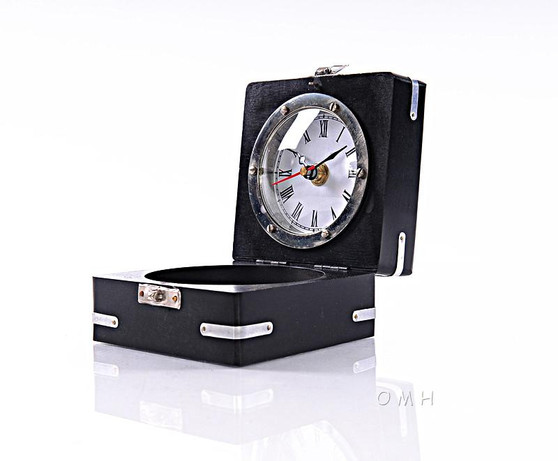This Beautiful Brass Compass & Clock With Wooden Case "AK006" Is Presented By Old Modern Handicrafts. The perfect gift for him! This handsome clock and compass embody the values of staying on time and in the right direction like a true navigator. On the bottom of the case is an excerpt from Robert Frosts "The Road Not Taken", which further embraces the true spirit of an explorer of life. Compass and fittings made out of aluminum with a shiny nickel finish. Clock uses one AA 1.5V battery (battery not included). Metal clasp to keep the case closed. Robert Frost poem etched in black.
After the naval disaster of 1707 where four ships ran ashore due to navigational mistakes, the British government offered 20000 (equivalent to millions today) for anyone who could determine longitude accurately. The reward was finally claimed in 1761 by Yorkshire carpenter John Harrison, who dedicated his life to improving the accuracy of his clocks. Inspired by Harrisons clock of the 1700s, the marine chronometer was developed out of the need to have a timekeeper of great accuracy that would function at sea. It was a necessity because it enabled the ships navigator to find Longitude out of the sight of land and thus his position on the seas and oceans of the world.| GENERAL INFORMATION |
| SKU | AK006 |
| Manufacturer | Old Modern Handicrafts |
| Category | Nautical |
| UPC | 640901135366 |
| Ship Via | FedEx |
| Dimensions | 4W x 6L x 6H Inches, Weight 1 Lbs |
| Carton Dimensions | 5W x 5L x 4H Inches, Weight 2 Lbs |
| History | After the naval disaster of 1707 where four ships ran ashore due to navigational mistakes, the British government offered 20000 (equivalent to millions today) for anyone who could determine longitude accurately. The reward was finally claimed in 1761 by Yorkshire carpenter John Harrison, who dedicated his life to improving the accuracy of his clocks. Inspired by Harrisons clock of the 1700s, the marine chronometer was developed out of the need to have a timekeeper of great accuracy that would function at sea. It was a necessity because it enabled the ships navigator to find Longitude out of the sight of land and thus his position on the seas and oceans of the world. |










